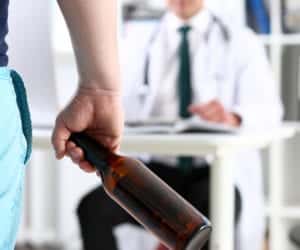Dangers of Stopping Drinking Alcohol Suddenly

Medical detox helps reduce the dangers of stopping drinking alcohol suddenly.
Alcohol dependence is characterized by withdrawal symptoms that occur when you stop drinking. The dangers of stopping drinking alcohol suddenly include seizures, heart problems, and even death. Medical detox is essential for ending a dependence on alcohol.
Learn more about alcohol detox here.
How Dependence Develops
Dependence is characterized by withdrawal symptoms that set in when you stop using. It’s different from addiction, which is characterized as compulsive alcohol abuse despite the negative consequences. Dependence develops as your brain changes its chemical function in response to heavy alcohol abuse.
In the beginning, alcohol enhances the activity of the neurotransmitter GABA, which produces feelings of wellbeing and calm. It suppresses the activity of glutamate, which is responsible for feelings of excitability. This is why you feel relaxed when you drink. But when your alcohol use becomes heavy, the brain compensates for its presence by suppressing the activity of GABA and increasing the activity of glutamate in order to maintain normal function.
This change in brain function produces tolerance, which means that you need increasingly larger amounts of alcohol to get the desired effects. But as you drink more, your brain continues to change it neurotransmitter function in order to compensate. At some point, brain function shifts so that it now operates more comfortably when alcohol is present. Then, when you go about quitting alcohol cold turkey, normal neurotransmitter activity rebounds–GABA floods the brain, and glutamate activity is reduced. This causes physical alcohol detox symptoms, which comprise the dangers of stopping drinking alcohol suddenly.
Alcohol Detox Symptoms
The symptoms of alcohol withdrawal can range in intensity from mild to severe, and not everyone will experience all of the withdrawal symptoms associated with alcohol detox. Early withdrawal symptoms typically begin between two and 12 hours after the last drink and include:
• Tremors.
• Anxiety.
• Nausea and vomiting.
• Headache.
• Insomnia.
• Profuse sweating.
• Hallucinations that are distinguishable from reality.
• Intense alcohol cravings.
Between 24 and 48 hours after the last drink, withdrawal seizures may occur. The risk of seizures is higher in people who have been through detox before.
The real dangers of stopping drinking alcohol suddenly come in the form of delirium tremens, or DTs, which is a form of severe alcohol withdrawal that can quickly and unexpectedly turn fatal. Symptoms of DTs include:
• Disorientation and confusion.
• Severe anxiety.
• Spikes in blood pressure, heart rate, and breathing rate.
• Hallucinations that are not distinguishable from reality.
• Seizures.
• Fever.
• Severe tremors.
Medical Detox is Essential for Alcohol Withdrawal
Quitting alcohol cold turkey can be dangerous, but it’s not just the dangers of stopping drinking alcohol suddenly that makes medical detox essential for ending dependence on alcohol. Most people who try to stop drinking on their own will quickly turn back to alcohol just to end the withdrawal symptoms, which can be excruciating.
During medical detox, which is overseen by medical and mental health professionals, a variety of medications may be used to reduce the severity of withdrawal symptoms and shorten the time it takes to detox. Medical detox offers a high level of support from peers and staff during detox, and many programs offer complementary therapies like restorative yoga, massage therapy, or acupuncture to help reduce symptoms and improve feelings of wellbeing.
A variety of assessments are given during medical detox to help providers determine your unique and specific needs, issues, and challenges for recovery. These assessments help guide the development of an individualized treatment plan that will begin once detox is complete and brain function has returned to normal.
Treatment is Essential for Ending the Addiction
Detox is not addiction treatment. Medical detox only addresses the physical dependence on alcohol and does very little to address the addiction, which is more complex than dependence and requires a variety of therapies to end for the long-term. Through addiction treatment after medical detox, you’ll develop the skills and strategies you need to stay sober, and you’ll identify and resolve the range of underlying issues that led to the alcohol abuse in the first place. You’ll learn to relax and have fun without alcohol, and you’ll find purpose and meaning in a life of sobriety.
Medical detox is crucial for safely and effectively ending a dependence on alcohol, and treatment is essential for treating the addiction. Most people who enter medical detox and engage with their treatment plan afterwards will enjoy long-term recovery and a higher quality of life moving forward.
If you or a loved one needs help with abuse and/or treatment, please call the WhiteSands Treatment at (877) 855-3470. Our addiction specialists can assess your recovery needs and help you get the addiction treatment that provides the best chance for your long-term recovery.
